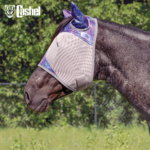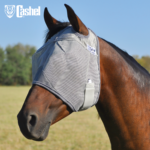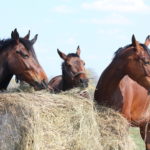
Feeding herbs to horses is rapidly becoming more popular. Some of these herbs are actually part of the natural diet of a grazing horse and do not have much medicinal effect. But other herbs have the potential for more drug-like effects in horses. We are not necessarily recommending these herbs, but we are discussing them because they are available in equine products.
It’s important to remember that any substance that can alter how the body functions, whether “natural” or not, must be viewed and used with the same respect and precautions as a drug in a bottle or jar. Anything can have harmful or unwanted effects when used in the wrong amounts, at the wrong time or in combination with the wrong things.
Below are just a few of the most commonly used herbs, how they are used and what interactions they can have with drugs and other herbs. This list is not intended to be complete, nor are we making any recommendation for use of these products. But this will give you some idea of the types of problems that you can run into should you use them. While it’s true that most drugs are more potent and have more side effects than most herbals, this isn’t always the case, especially with Chinese herbs, and no herbs should be used casually.
Herb: Chamomile
Used For: Calming, anti-inflammatory effects.
Drug Interactions: Potential for increased clotting time when used with non-steroidal anti-inflammatory drugs (NSAIDs, e.g., phenylbutazone), aspirin or drugs that influence clotting (heparin, Coumadin). Potential for interaction with sedatives/tranquilizers, narcotics and anesthetics.
Herbs and the Immune System
A variety of herbs have the capacity to “shake up” the immune system. They do this because they themselves are immune-system irritants.
A horse that has an active infection already has his immune system activated. Therefore, use of these herbs under that condition should be done only with caution, if at all, and never without involving your veterinarian.
Another problem is that immune-stimulating herbs act primarily on the “primitive” immune system, the immunity pathways that produce inflammatory, autoimmune and allergic reactions. Because of this, if you give them to a sick horse, you will often get more symptoms (e.g., fever).
Immune-system stimulants are also not a good idea in horses with allergies or with autoimmune problems such as severe strangles reactions or chronic Lyme infections.
Herbs with this immune “shake up” action include:
- Echinacea
- Astragalus or milk vetch
- Ginsengs
- Garlic
- Elecampane
- Boswellia
Herbal Interactions: See herbs and bleeding sidebar. Use with caution with other calming herbs.
Herb: Devil’s Claw
Used For: Pain relief, anti-inflammatory.
Drug Interaciions: Potential for increased clotting time when used with NSAIDs (e.g., phenylbutazone), aspirin or drugs that influence clotting (heparin, Coumadin). May irritate stomach ulcers, so do not give to horses receiving treatment for ulcers.
Herbal Interactions: See herbs and bleeding sidebar
Herb: Echinacea
Used For: Immune system stimulation.
Drug Interactions: Corticosteroids counteract the effect. Echinacea may increase allergic reactions in individuals with respiratory or skin allergies.
Herbal Interactions: See herbs and the immune system sidebar below.
Herb: Garlic
Used For: Repelling flies. Believed to help the immune system.
Drug Interactions: Potential for increased clotting time when used with NSAIDs (e.g., phenylbutazone), aspirin or drugs that influence clotting (heparin, Coumadin).
Herbal Interactions: See herbs and bleeding sidebar.
Herb: Ginsengs(several varieties)
Used For: “Tonic,” balancing, increasing resistance to stress of any type.
Drug Interactions: May interfere with pain-relieving effects of narcotics. Potential for increased clotting time when used with NSAIDs (e.g., phenylbutazone), aspirin or drugs that influence clotting (heparin, Coumadin).
Herbal Interactions: Any particular type may either counteract or increase the effects of another ginseng. This can produce strong stimulant effects on the heart and high blood pressure. Do not mix. See herbs and bleeding sidebar.
Herbs and Bleeding
A large number of herbs have been found to increase clotting time by a variety of mechanisms. This rarely, if ever, leads to spontaneous bleeding problems (like nosebleeds), but could be a problem in high doses if the horse is injured, requires surgery or is prescribed a drug that also influences blood clotting. The herbs known to influence clotting include:
- Ginkgo
- Hawthorn berry
- Garlic
- Ginger
- Bilberry
- Dong quai (angelica)
- Feverfew
- Ginseng
- Turmeric
- White Willow
- Devil’s Claw
- Meadowsweet
- Red clover
- Chamomile
- Fenugreek
Herb: Kava Kava
Used For: Calming.
Drug Interactions: Uncertain. Potential for interaction with sedatives/tranquilizers, narcotics and anesthetics.
Herbal Interactions: Uncertain. Use caution with other calming herbs.
Herb: Licorice
Used For: Stomach complaints, stimulant.
Drug Interactions: Diuretics, can lead to increased loss of the electrolyte potassium in the urine. May increase side effects of corticosteroids.
Herbal Interactions: Do not combine with herbs that can increase blood pressure, such as ginsengs.
Herb: Valerian Root
Used For: Calming.
Drug Interactions: Uncertain. Potential for interaction with sedatives/tranquilizers, narcotics and anesthetics.
Herbal Interactions: Uncertain. Use caution with other calming herbs.
Herb: Vitex Agnus Castus (Chastetree Berry, Monk’s Pepper)
Used For: Mare-cycling abnormalities, aggressive/irritable behavior (both sexes). High doses may help control symptoms of Cushing’s disease.
Drug Interactions: In low dose may worsen some Cushing’s symptoms, like udder filling and lactation in mares. Potential for interaction with domperidone, the drug used to treat tall fescue toxicosis. Low dose may increase domperidone effects; high doses may counteract. Possibility for interactions with drugs given to induce ovulation, estrogens (used for stifle problems) or progestins like Regumate.
Herbal Interactions: Uncertain, but possible interaction with red clover (estrogen effect).
Herb: White Willow
Used For: Pain relief, inflammation.
Drug Interactions: Aspirin, heparin, Coumadin.
Herbal Interactions: Meadowsweet (enhanced effect) and any herb that decreases coagulation (blood clotting, see herbs and bleeding sidebar above).





